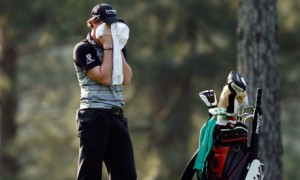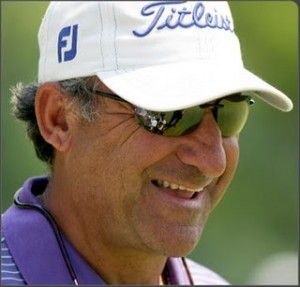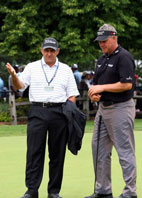When it comes to golf psychology, Bob’s the man
Guest Author: James Rogers, MD at iSpyGolf and a golfer who regularly enjoys bouts of the yips.
We all know how important our mind is in this wonderfully infuriating game. Every time we stride confidently on to the tee following a birdie or feel our knees tremble over a three foot putt, both sides of the coin are patently clear to us.
To me, what’s most amazing about the whole thing is how a game, a leisure pursuit we voluntarily play for enjoyment (apparently), can leave us stricken with physical symptoms more often associated with genuine fear. It’s ludicrous; what’s the worst that can happen?
 This is a side of the game that fascinates me. I’ve watched players like Ian Baker-Finch go from Claret Jug to missing the “unmissable” first fairway at St. Andrews in the space of a few short years and thought, how is that possible? And he’s not alone. I’m sure we can all name other top players who have gone the same way. The common theme with all is that it’s the mental collapse that precipitates the physical breakdown, and it’s often painful viewing. Just this year at the Masters we endured watching Rory McIlroy’s mind reduced to “blancmange”, in Wayne Grady’s words, an ordeal that made his performance at the US Open all the more impressive. And that’s the kind of morbid fascination, for me. How can someone that good suddenly play that badly?
This is a side of the game that fascinates me. I’ve watched players like Ian Baker-Finch go from Claret Jug to missing the “unmissable” first fairway at St. Andrews in the space of a few short years and thought, how is that possible? And he’s not alone. I’m sure we can all name other top players who have gone the same way. The common theme with all is that it’s the mental collapse that precipitates the physical breakdown, and it’s often painful viewing. Just this year at the Masters we endured watching Rory McIlroy’s mind reduced to “blancmange”, in Wayne Grady’s words, an ordeal that made his performance at the US Open all the more impressive. And that’s the kind of morbid fascination, for me. How can someone that good suddenly play that badly?
I’m not an idle bystander in all this, either. Without reducing this to an “all about me” anecdote, I think some of you will be able to empathise with my plight.
Like many others, I have the dubious honour of being a “Range King”, capable of hitting dozens of purely struck, arrow straight drives ahead of a pushed-slice off the first tee that heads 45 degrees right in an arc that bears greater resemblance to a cover drive than anything you’d see from Mr Mickelson. It’s a yip, a twitch, an electric shock to the hands that I can feel brewing even before I’ve started swinging the club.
I’ve talked to professionals about it and the answer is always a technical one: my swing is too flat on the way back for my hands to recover; my hips are too close to my hands at impact; my wrists are too cupped through the ball. All of these may be true but they don’t stop me hitting good shots all day long on the range, so I just don’t believe that’s the fundamental cause. I know PGA professionals don’t get paid to tell you that your swing’s perfect (and mine is far from it) but the mechanics aren’t the root of the problem.
 Perhaps I’m a golfing masochist but all the years I’ve known the problem to be a mental one, I’ve never once sought help. Golf psychologists were dismissed as purveyors of self-evident mumbo-jump and they couldn’t tell me anything I couldn’t tell myself. That was until I read a book called “The Golfer’s Mind” by Dr Bob Rotella. My brother bought it for me, in fact, in the hope that he could save me from a life as “the weakest mental golfer in the world” (his words). I have to honest, had he not given it to me, I’m pretty sure I would never have resorted to buying it. Still, once in my possession I decided I had nothing to lose in hearing what Dr Rotella had to say (or my friend Bob, as I like to think of him now).
Perhaps I’m a golfing masochist but all the years I’ve known the problem to be a mental one, I’ve never once sought help. Golf psychologists were dismissed as purveyors of self-evident mumbo-jump and they couldn’t tell me anything I couldn’t tell myself. That was until I read a book called “The Golfer’s Mind” by Dr Bob Rotella. My brother bought it for me, in fact, in the hope that he could save me from a life as “the weakest mental golfer in the world” (his words). I have to honest, had he not given it to me, I’m pretty sure I would never have resorted to buying it. Still, once in my possession I decided I had nothing to lose in hearing what Dr Rotella had to say (or my friend Bob, as I like to think of him now).
“That’s me in a nut-shell” I thought on about page two. And then again on pages five, six, nine, twelve….. you get the idea. I admit that I may be afflicted by more mental frailties on the golf course than most, but here was someone that truly understood my plight and didn’t just say, “Come on, you’re good at this game, just hit it”. Better still, Bob’s conclusions and advice made sense and gave me something to take out on to the course, much like a single swing thought. Amongst others, there were simple, concise, two-page chapters on “Fear” (as noted above, what’s the worst that can happen?), “Confidence”, “Trust”, “Commitment” and “Perfectionism” (his thoughts on which you’ll appreciate given his previous book’s title, “Golf Is Not A Game Of Perfect”).
Out on the course things have gone reasonable well, too (kiss of death). OK, I haven’t had time to play much since reading Bob’s words of wisdom but it came as little surprise to me to see my new hero chatting away with Darren Clarke ahead of his final round at Royal St. George’s last month. I also hear that, following Clarke’s win, Lee Westwood has also turned to the same guru to help him over that final hurdle of transforming his undoubted talent and remarkable consistency into Major wins.
 All this got me thinking. What can Bob be saying to these greats of the game that he hasn’t said in his book? I’m sure he’s charging Clarke more than £7.99. When it comes to mental self-help, is getting told to think positively in person any better than reading the same advice on paper?
All this got me thinking. What can Bob be saying to these greats of the game that he hasn’t said in his book? I’m sure he’s charging Clarke more than £7.99. When it comes to mental self-help, is getting told to think positively in person any better than reading the same advice on paper?
I could be wildly off the mark but, to my mind, psychology is one aspect of the game where we, the hackers, can enjoy the same quality of tuition as the professionals, without the expense.
Here’s my reasoning:
1. The joy of Bob’s book (and I’m sure there are others equally good on the market) is that it delivers his perceptive pearls of wisdom in pithy and memorable phrases that stay with you. The book is written with the intention of being carried and turned to repeatedly, rather than read cover-to-cover and never looked at again.
2. The one positive thing you can say about a mental failing as opposed to a technical one is that appreciating you have a problem may take nothing more than a moment’s self-reflection. For example, it won’t take your local PGA pro to tell you that your inclination to shake like a leaf when putting doesn’t help you get the ball in the hole, whereas your nerveless playing partner who’s missing just as many putts may not realise it’s because his shoulders are too closed at address.
3. Once you know you’ve got a problem and are open to some help, Dr Rotella and others are on-hand (in written form at least) to diagnose and to offer up some sage advice. And this is where I see written psychological self-help far outweighing the potential of technical books and tips from the pros in Golf Monthly to help improve your swing. When it comes to technique, you need someone else to watch and diagnose your faults before you can start applying the fixes. But, for affairs of the mind, with someone holding up a mirror in written format or any other, and you can self-diagnose effectively and start heeding the advice. The self-help tips are just as powerful and effective read in a book as they are said face-to-face. And once you’re out on the course, it’s just you and your demons anyway. Who needs a couch?
So, what am I trying to say? Well, I’m sure Darren and countless others will tell you Bob’s personal coaching is invaluable (and, if you hadn’t noticed, I’m a converted follower these days so I don’t need convincing), but I still think there’s an argument to say that, unlike with physical tuition, the best psychological assistance in the game is available to us all, courtesy of that old fashioned medium, the book. We may not be able to pay Butch Harmon to stand next to us on the range, but we can all sit Bob Rotella on our shoulder. If it’s good enough for Darren, it’s good enough for me.